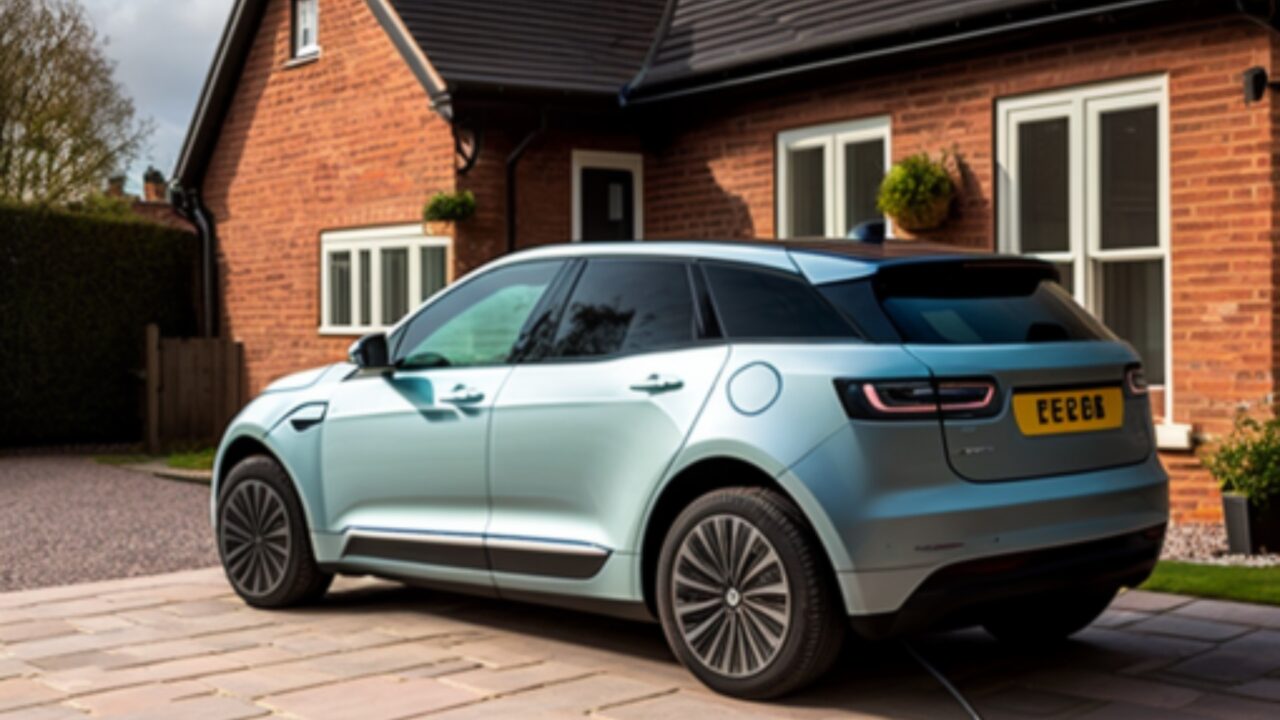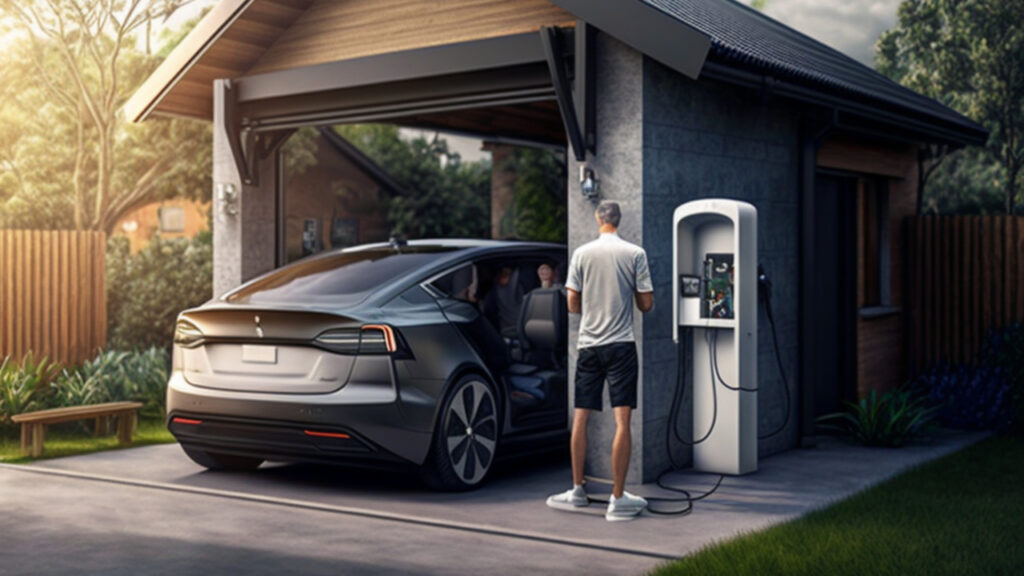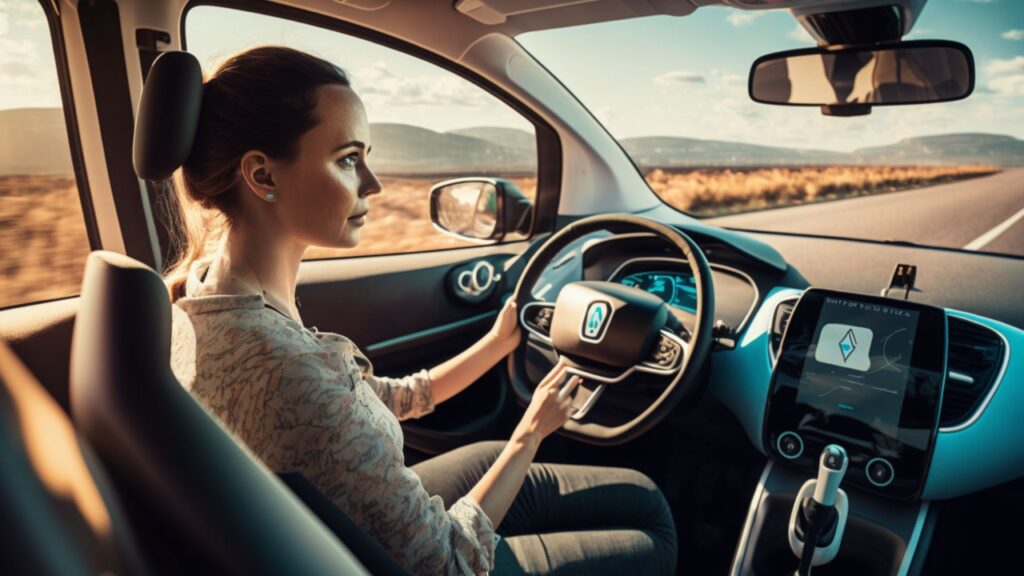Our guide to electric cars covers all the basics to help you make an informed decision before you buy. Learn about the advantages and disadvantages of electric vehicles, charging options and much more.
- How far can I travel on a single charge?
With advancements in technology, electric cars have improved their range, offering drivers the ability to travel hundreds of miles on a single charge. Many cars offer approximately 200 miles on a charge whilst some manufacturers boast an impressive 600-mile range.

2. How long does it take to charge the battery?
The time it takes to charge the battery varies between electric cars, with some models offering quick charging options that can charge the battery to 80% in as little as 30 minutes. The charging method and devices also vary, for example, a 100kWh battery would take 2 hours if delivered at 50kW, but through a simple three-pin socket, it would take over 43 hours.
3. Are there enough charging stations available for my needs?
Charging infrastructure is rapidly expanding, with more and more charging stations becoming available for electric car owners. Most public charging stations offer a variety of charging options to fit your needs.
4. How does the cost of running an electric car compare to a petrol/diesel car?
Running an electric car can be significantly less expensive than a traditional petrol/diesel car, especially in terms of fuel costs, which can save you money in the long run.
5. Are there any government grants or incentives available for buying an electric car?
Government grants and incentives are available in many countries to encourage the adoption of electric cars, making them more accessible to a wider range of consumers. There aren’t currently grants in the UK for cars but can be available for some vans and Motability vehicles.
6. What is the range of the different electric cars available on the market?
Electric car models range in terms of their battery size, with some models offering a range of up to 600 miles, while others offer a more modest range of 100-150 miles.
7. Are there any concerns about the environmental impact of the materials used in electric car batteries?
The impact of electric car batteries on the environment is a topic of ongoing research and discussion, but it is widely acknowledged that electric cars have a lower carbon footprint compared to traditional petrol/diesel cars.
8. How does the performance and driving experience compare to a petrol/diesel car?
Electric cars offer a unique driving experience with instant torque and a smooth and quiet ride. Many electric car models have been praised for their performance and handling, making for an enjoyable driving experience. Manufacturers have taken care to develop vehicles that accelerate similarly to internal combustion engine-powered vehicles.
9. How long do the batteries typically last and what is the replacement cost?
The lifespan of an electric car battery varies, but with proper care, most batteries are expected to last for several years. The cost of replacing a battery can vary depending on the make and model of the car. You should expect 3 years of trouble-free use and most manufacturers offer a warranty for their EV batteries that covers them. Most new batteries are expected to last 10 to 20 years.

10. Are there any restrictions on where I can drive an electric car?
There are few restrictions on where you can drive an electric car, and they can be driven just like traditional petrol/diesel cars. However, it is recommended to plan your route in advance to ensure there are charging stations available when needed.
11. Can I charge my electric car at home or do I need to go to a public charging station?
You have the option of charging your electric car at home using a home charging unit, or you can use public charging stations if needed. Home charging is convenient and often the fastest and most cost-effective way to charge your electric car.
12. How does the maintenance cost of an electric car compared to a petrol/diesel car?
The maintenance cost of electric cars is generally lower compared to traditional petrol/diesel cars, with fewer moving parts and no need for regular oil changes. However, the cost of maintenance can vary depending on the make and model of the car. Services in general are reduced to every 2 years but when your MOT is due it is still every year.
13. Are there any differences in the insurance costs for electric cars?
Insurance costs for electric cars can be slightly more than traditional petrol/diesel cars, but some insurers may offer discounts due to the lower emissions and improved safety features of electric cars.
14. Are there any special tax incentives for electric car owners in the UK?
Yes, there are a number of tax incentives for electric car owners in the UK, including lower road tax and exemption from the London Congestion Charge, but these things are likely to change as more electric vehicles hit the road.
15. Can I use my electric car for long-distance travel or is it better suited for city driving?
Electric cars are becoming increasingly popular for long-distance travel, with many models offering a range of over 200 miles on a single charge. However, electric cars are also well suited for city driving, making them a versatile choice for many drivers.
16. How does the resale value of an electric car compare to a petrol/diesel car?
The resale value of electric cars is growing as demand for these vehicles continues to increase. Some electric car models have been shown to hold their value better than traditional petrol/diesel cars, making them a smart investment in the long term.
17. Are there any options for renting or leasing an electric car?
Yes, there are a variety of options for renting or leasing an electric car, making it easy and convenient for those who may not be ready to make the full investment in owning an electric car.
18. The government plans to phase out petrol/diesel cars. What impact will it have on electric cars?
Many countries are exploring plans to phase out traditional petrol/diesel cars, which as expected has increased demand for electric cars. This shift is likely to drive further innovation and improvement in the electric car industry.
19. How does the overall environmental impact of electric cars compare to petrol/diesel cars?
Electric cars produce significantly lower emissions compared to traditional petrol/diesel cars, and they have a smaller overall environmental impact. This makes electric cars an attractive option for those looking to reduce their carbon footprint.
20. Are there any additional safety features in electric cars?
Yes, many electric car models come equipped with a variety of advanced safety features, including advanced driver assistance systems (ADAS) and enhanced crash protection. Additionally, the instant torque and quiet operation of electric cars can improve overall safety on the road.
21. How does the handling and manoeuvrability of electric cars compare to petrol/diesel cars?
Electric cars are often praised for their smooth and instant torque, which can make them feel more nimble and responsive compared to traditional petrol or diesel vehicles. Additionally, the lack of a traditional transmission can also enhance the handling and overall driving experience. However, the weight distribution and centre of gravity can vary between electric cars and petrol/diesel cars, which may affect the handling in certain scenarios. Usually, batteries are situated below the passenger compartment so the centre of gravity is lowered which improves handling.
22. Can I use my electric car for towing or do they have any weight restrictions?
The towing capacity of an electric car can vary greatly depending on the make and model. Some electric vehicles are capable of towing small trailers or caravans, while others may not have the power or capability to do so. It’s important to check the manufacturer’s specifications and guidelines before attempting to tow anything with your electric car.
23. Are there any specific regulations or requirements for owning an electric car?
There may be specific regulations or requirements for owning an electric car, mostly related to the charging products installed at your home and elsewhere. You should consult your installer or manufacturer for specific requirements which can change as technology develops. For instance, self-driving technology and its uses are currently under discussion in the UK for implementation in 2025.
24. How does the noise level of an electric car compare to petrol/diesel cars?
Electric cars produce very little noise compared to traditional petrol or diesel vehicles. This can make for a quieter and more relaxed driving experience. However, some electric cars do have sound generators installed for safety reasons, which can emit a low-level hum at low speeds to alert pedestrians and other road users.

25. Are there any special precautions I need to take when parking an electric car?
When parking an electric car, it’s important to take into consideration the charging requirements and safety precautions. This may include ensuring the car is parked in a well-ventilated area, avoiding extreme temperatures, and properly locking the car to prevent unauthorized access. It’s important to consult with the manufacturer for specific recommendations and guidelines.
26. Are electric cars suitable for people with mobility restrictions?
Electric cars can be suitable for people with mobility restrictions, as many models are designed with accessibility in mind. This may include features such as adjustable seats, easy-to-use controls, and ample legroom. Additionally, some electric cars have been designed to accommodate wheelchairs or mobility scooters. It’s important to consult with the manufacturer for specific recommendations and accessibility features and you may be eligible for grants too.
27. Are electric cars suitable for people with large families?
Electric cars are generally based around current petrol/diesel models and so are suitable for families, especially those with small to medium-sized families. Many models offer ample space for passengers and luggage, as well as a spacious cabin.
28. How does the speed and acceleration of electric cars compare to petrol/diesel cars?
The speed and acceleration of an electric car can vary greatly depending on the make and model. Some electric cars are designed to offer instant torque and quick acceleration, which can provide a fast and smooth driving experience. As things have advanced, cars now react similarly to their ICE counterparts, but the lack of traditional gears can also enhance the overall acceleration.
29. Can I use electric cars in areas with poor or no mobile or internet signal?
Electric cars can be used in areas with poor or no mobile or internet signal, as they do not rely on these services for their operation. However, some advanced features like navigation may be unavailable in such areas.
30. How does the cargo and storage capacity of electric cars compared to petrol/diesel cars?
Electric cars often have comparable or even larger cargo and storage capacities compared to traditional petrol or diesel cars. Many electric cars are designed with a flat floor, allowing for more space for luggage or other items. Additionally, electric cars typically have fewer engine components, freeing up more space.
31. Can I use my electric car for long-distance road trips?
Yes, you can use your electric car for long-distance road trips, especially with the increasing number of charging stations available. However, it may require more planning and more frequent or longer stops to charge the battery, compared to traditional petrol or diesel cars. However, in the UK, the range would not normally be an issue if you have a charging point at an overnight stay for instance.
32. Can I charge an electric car at home?
Charging your electric car at home is a convenient option and can be done using a standard electrical outlet, but this is slow and you should have a dedicated home charging unit installed by a competent registered person.
33. What about charging electric cars on the road?
Charging your electric car on the road is possible, at one of the many public charging stations available across the country. These charging stations offer various charging speeds and options, allowing you to charge your car quickly and easily while you are on the go.
34. Are there differences in servicing electric cars?
Servicing an electric car is typically less expensive and more straightforward compared to traditional petrol or diesel cars. This is due to the fewer moving parts and less complex systems in electric cars. However, you may need to find a specialist for any electric car issues as these can differ from each other.
35. Are there any specific regulations for disposing of electric cars?
Yes, there are specific regulations for disposing of electric cars and more specifically their parts. These regulations vary from country to country, but typically involve recycling the batteries and other components as many items will have a second use. Batteries for example may still have use for storing energy from solar panels.
36. Are there any specific regulations for customising or modifying electric cars?
Yes, there are specific regulations for customising or modifying electric cars, which vary from country to country. Some modifications may not be allowed, while others usually require approval or certification before they can be used on the road.
37. Can I use my electric car in remote or rural areas?
Yes, you can use your electric car in remote or rural areas, although charging options may be more limited. It’s important to plan your trips and ensure that you have enough battery power to reach your destination.
38. Are there any specific regulations for using electric cars in coastal areas?
There aren’t any specific differences between ICE and electric-powered cars in the UK.
39. Can I use electric cars in areas with poor or no power supply?
Using an electric car in areas with limited or no power supply can be a concern, but many electric cars are equipped with features such as regenerative braking and efficient energy management systems to help extend the range of the vehicle.
40. What are the different types of electric cars available?
There are several different types of electric cars available, including fully electric vehicles (EVs), hybrid electric vehicles (HEVs), and plug-in hybrid electric vehicles (PHEVs). All-electric vehicles run solely on electricity, while hybrid electric vehicles have both an electric motor and a traditional internal combustion engine. Plug-in hybrid electric vehicles can be charged using an external power source and have a larger battery capacity than traditional hybrids.
41. How does the warranty and service coverage for electric cars compared to petrol/diesel cars?
Warranty and service coverage for electric cars generally compare favourably to petrol/diesel cars, with many manufacturers offering longer warranty periods for the battery and electric drivetrain components. Service and maintenance costs for electric cars are often lower than for traditional vehicles, as they have fewer moving parts.
42. Can I use my electric car for commercial purposes?
Yes, many electric cars can be used for commercial purposes, and some are specifically designed for fleet operations. However, it’s important to check with your insurer for requirements regarding commercial use.
43. Are there any specific regulations for using electric cars in fleet operations?
In the UK, there are specific regulations and requirements for fleet operations, mainly regarding the charging infrastructure.
44. How does the availability of electric car models compare to petrol/diesel cars?
The availability of electric car models is rapidly increasing, with many manufacturers launching new models and expanding their electric car offerings. However, the number of electric car models available on the market is relatively limited compared to traditional petrol/diesel cars.

45. Are electric cars safe?
Yes, electric cars are safe and are subject to the same safety standards and regulations as traditional petrol/diesel cars. In fact, many electric cars have additional safety features, such as regenerative braking and instant torque, that can enhance the overall driving experience.
46. Are electric cars expensive?
The cost of electric cars can vary depending on the model, manufacturer, and features included. While in general, electric cars may be more expensive than traditional petrol/diesel cars, the cost can be offset by lower running costs, such as lower fuel and maintenance expenses.
47. What can I do if I break down or run out of charge on a journey?
If you break down or run out of charge while driving an electric car, you can use the car’s onboard navigation system to locate the nearest charging station or use a mobile app or website to find nearby charging locations. Many electric car manufacturers also offer a breakdown and recovery service, which can assist in the event of a breakdown. Many recovery companies carry enough charge for about 10 miles on their vans too.
48. Can you do DIY maintenance on an electric car?
Yes, some basic maintenance tasks, such as checking tyre pressure and replacing wiper blades and bulbs, can be done by the owner of an electric car. However, more complex tasks, such as battery replacement or repair, should only be performed by a trained professional. It’s important to follow the manufacturer’s recommendations for the maintenance of your vehicle.
49. What are the charging regulations?
In the UK, the government is taking steps to encourage more drivers to make the switch to electric cars by introducing regulations that set out the capabilities that home and workplace chargers should have. These regulations emphasise smart charging functionality so that charge points can be used more efficiently and make the most of available renewable energy. They also give drivers access to detailed information and statistics on their charging events, providing greater security as well.
50. Who can fit a home charger?
It’s important to find an installer that has experience in EV charging installations so you can be sure you’re getting the best quality installation and reliable service. Installing an EV charging station safely requires expert knowledge and experience, as well as compliance with UK regulations. Look for experienced EV charging station installers that may be able to offer grants to subsidies costs to save you money.
For more information about electric cars, view our ultimate guide here.
